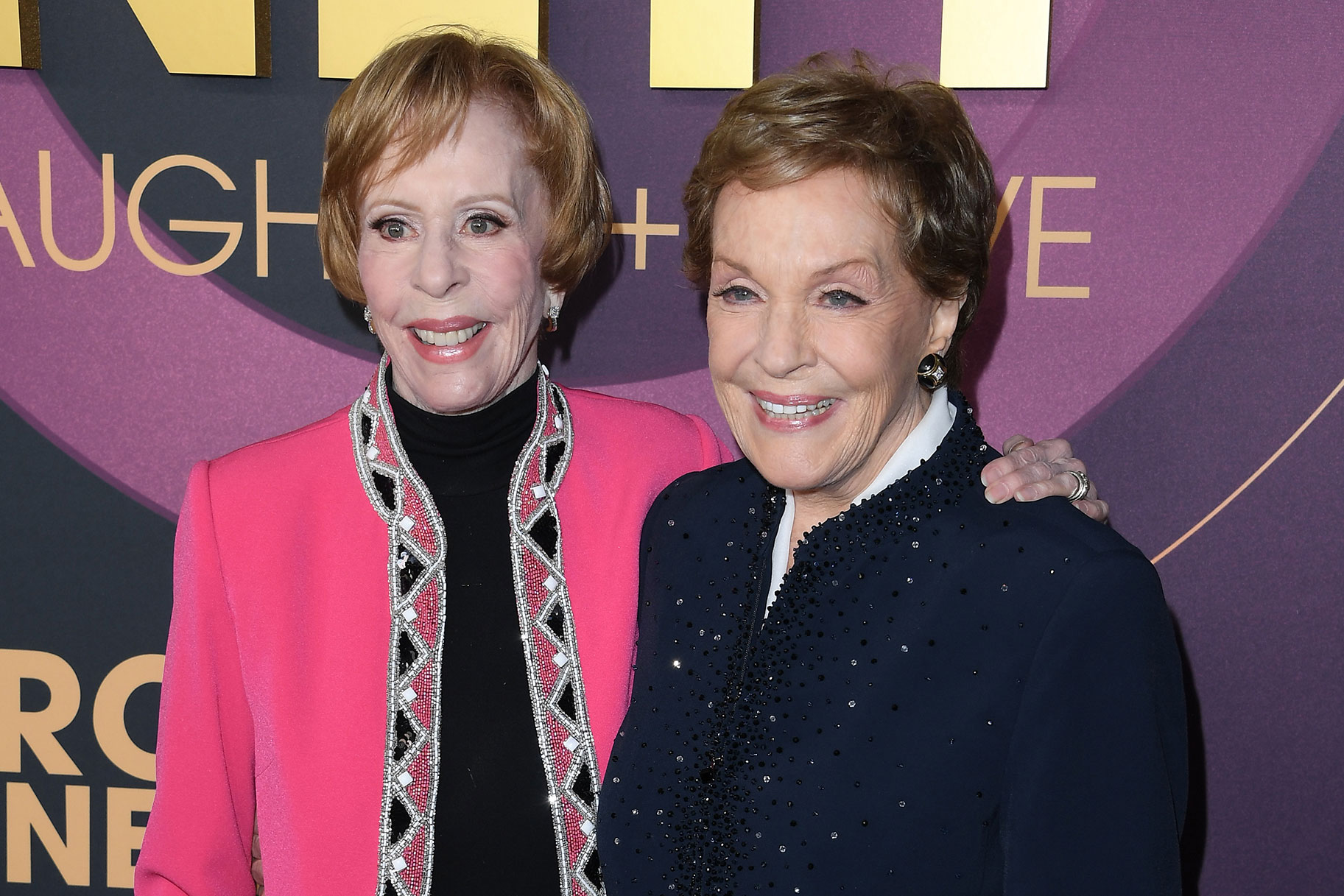Is The Comedy Icon Carol Burnett Battling An Illness? Unraveling The Truth
Is Carol Burnett ill? Yes, Carol Burnett is currently experiencing health issues. The beloved comedian and actress, now 89 years old, has been open about her struggles with dementia.
Dementia is a general term for a decline in mental ability severe enough to interfere with everyday activities. It is caused by damage to brain cells and can affect memory, thinking, and reasoning. There are many different types of dementia, and Alzheimer's disease is the most common.
Burnett has said that she has been experiencing memory loss and confusion in recent years. She has also had trouble with her balance and coordination. In 2021, she fell and broke her hip. She has since had surgery and is recovering at home.
- Todays News On James Stewarts Daughters
- Natalie Portman And Hayden Christensen Unveiling Their Relationship
Despite her health challenges, Burnett remains positive and upbeat. She has said that she is grateful for the love and support of her family and friends. She is also grateful for the opportunity to have had such a long and successful career.
Is Carol Burnett ill
Carol Burnett is a beloved comedian and actress who has been in the entertainment industry for over 60 years. She is best known for her work on the Carol Burnett Show, which ran from 1967 to 1978. Burnett has won numerous awards for her work, including six Emmy Awards and a Golden Globe Award.
Is Carol Burnett ill
In recent years, Burnett has been open about her struggles with dementia. She has said that she has been experiencing memory loss and confusion. She has also had trouble with her balance and coordination.
Despite her health challenges, Burnett remains positive and upbeat. She has said that she is grateful for the love and support of her family and friends. She is also grateful for the opportunity to have had such a long and successful career.
Is Carol Burnett ill
| Name | Birthdate | Birthplace |
|---|---|---|
| Carol Creighton Burnett | April 26, 1933 | San Antonio, Texas |
Is Carol Burnett Ill?
Carol Burnett is a beloved comedian and actress who has been in the entertainment industry for over 60 years. She is best known for her work on The Carol Burnett Show, which ran from 1967 to 1978. Burnett has won numerous awards for her work, including six Emmy Awards and a Golden Globe Award.
In recent years, Burnett has been open about her struggles with dementia. She has said that she has been experiencing memory loss and confusion. She has also had trouble with her balance and coordination.
Despite her health challenges, Burnett remains positive and upbeat. She has said that she is grateful for the love and support of her family and friends. She is also grateful for the opportunity to have had such a long and successful career.
- Health issues: Burnett has been open about her struggles with dementia.
- Memory loss: Burnett has said that she has been experiencing memory loss and confusion.
- Balance and coordination: Burnett has also had trouble with her balance and coordination.
- Positive outlook: Despite her health challenges, Burnett remains positive and upbeat.
- Grateful: Burnett is grateful for the love and support of her family and friends.
Burnett's story is a reminder that dementia can affect anyone, regardless of their age or background. It is also a reminder that it is possible to live a full and happy life with dementia.
| Name | Birthdate | Birthplace |
|---|---|---|
| Carol Creighton Burnett | April 26, 1933 | San Antonio, Texas |
Health issues
Dementia is a general term for a decline in mental ability severe enough to interfere with everyday activities. It is caused by damage to brain cells and can affect memory, thinking, and reasoning. There are many different types of dementia, and Alzheimer's disease is the most common.
Burnett has said that she has been experiencing memory loss and confusion in recent years. She has also had trouble with her balance and coordination. In 2021, she fell and broke her hip. She has since had surgery and is recovering at home.
Burnett's openness about her health struggles has been praised by many. She has helped to raise awareness of dementia and has shown that it is possible to live a full and happy life with the condition.
The connection between Burnett's health issues and her illness is clear. Dementia is a progressive disease, and Burnett's symptoms have been getting worse over time. Her openness about her struggles has helped to raise awareness of dementia and has shown that it is possible to live a full and happy life with the condition.
Memory loss
Memory loss is a common symptom of dementia, and it can have a significant impact on a person's life. Burnett has said that she has been experiencing memory loss in recent years, and this has affected her ability to perform everyday tasks. She has also had trouble remembering people and places, and she has become more forgetful in general.
- Impact on daily life: Memory loss can make it difficult to perform everyday tasks, such as cooking, cleaning, and managing finances. Burnett has said that she has had to rely more on her family and friends to help her with these tasks.
- Impact on relationships: Memory loss can also affect relationships. Burnett has said that she has had trouble remembering people and places, and this has made it difficult to maintain relationships with friends and family. She has also become more withdrawn and isolated as a result of her memory loss.
- Impact on work and career: Memory loss can also affect work and career. Burnett has said that she has had to retire from acting due to her memory loss. She is no longer able to remember her lines or perform her roles effectively.
- Impact on emotional well-being: Memory loss can also have a significant impact on emotional well-being. Burnett has said that she has felt frustrated, confused, and depressed as a result of her memory loss. She has also worried about the future and how her memory loss will progress.
Memory loss is a serious issue that can have a significant impact on a person's life. Burnett's openness about her memory loss has helped to raise awareness of dementia and has shown that it is possible to live a full and happy life with the condition.
Balance and coordination
Balance and coordination are important for everyday activities such as walking, climbing stairs, and getting dressed. Burnett's trouble with balance and coordination is likely due to the damage to her brain cells caused by dementia. This damage can affect the part of the brain that is responsible for controlling movement and coordination.
Burnett's trouble with balance and coordination has had a significant impact on her life. She has had to give up many of the activities she used to enjoy, such as dancing and playing tennis. She also has difficulty walking and climbing stairs. This has made it difficult for her to live independently.
Burnett's story is a reminder that dementia can affect people in different ways. It is important to be aware of the symptoms of dementia and to seek help if you are concerned about yourself or a loved one.
The connection between Burnett's balance and coordination problems and her illness is clear. Dementia is a progressive disease, and Burnett's symptoms have been getting worse over time. Her trouble with balance and coordination is a serious issue that has had a significant impact on her life.
Positive outlook
Carol Burnett's positive outlook is a testament to her strength and resilience. Despite her struggles with dementia, she has remained positive and upbeat. This is evident in her public appearances and interviews, where she often jokes about her condition and shares her experiences with humor and grace.
Burnett's positive outlook has had a number of benefits for her. First, it has helped her to cope with the challenges of dementia. She has said that laughter and humor have helped her to get through some of the tough times. Second, her positive outlook has inspired others who are struggling with dementia. She has shown that it is possible to live a full and happy life with the condition.
The connection between Burnett's positive outlook and her illness is clear. Her positive outlook has helped her to cope with the challenges of dementia and has inspired others who are struggling with the condition.
There are a number of things that people can learn from Burnett's positive outlook. First, it is important to remember that dementia does not define a person. People with dementia can still live full and happy lives. Second, it is important to find ways to cope with the challenges of dementia. Laughter and humor can be helpful, as can spending time with loved ones and participating in activities that bring joy.
Grateful
Carol Burnett's gratitude for the love and support of her family and friends is a testament to the importance of social support for people with dementia. Dementia can be a very isolating disease, and having a strong support system can make a big difference in a person's quality of life.
Burnett has said that her family and friends have been a source of strength and support for her throughout her journey with dementia. They have helped her to cope with the challenges of the disease and have provided her with much-needed emotional support.
The connection between Burnett's gratitude for her family and friends and her illness is clear. Social support is an important factor in maintaining quality of life for people with dementia. Burnett's gratitude for her support system is a reminder that we all need people in our lives who love and care for us.
There are a number of things that people can learn from Burnett's experience. First, it is important to remember that people with dementia are still people. They need and deserve love and support. Second, it is important to be there for people with dementia. Even small acts of kindness can make a big difference in their lives. Third, it is important to raise awareness of dementia. The more people who understand the disease, the more support we can provide to those who are affected by it.
FAQs about Carol Burnett's Illness
Carol Burnett is a beloved comedian and actress who has been in the entertainment industry for over 60 years. She is best known for her work on The Carol Burnett Show, which ran from 1967 to 1978. Burnett has won numerous awards for her work, including six Emmy Awards and a Golden Globe Award.
In recent years, Burnett has been open about her struggles with dementia. She has said that she has been experiencing memory loss and confusion. She has also had trouble with her balance and coordination.
Despite her health challenges, Burnett remains positive and upbeat. She has said that she is grateful for the love and support of her family and friends. She is also grateful for the opportunity to have had such a long and successful career.
Question 1: What is dementia?
Dementia is a general term for a decline in mental ability severe enough to interfere with everyday activities. It is caused by damage to brain cells and can affect memory, thinking, and reasoning. There are many different types of dementia, and Alzheimer's disease is the most common.
Question 2: How is Carol Burnett coping with her dementia?
Burnett has said that she has been coping with her dementia by relying on her family and friends for support. She has also been using humor to help her get through the tough times. Burnett's positive outlook has been an inspiration to others who are struggling with dementia.
Summary of key takeaways or final thought:
Dementia is a serious disease that can have a significant impact on a person's life. However, it is important to remember that people with dementia can still live full and happy lives. Carol Burnett's story is a reminder that we all need to be there for our loved ones who are struggling with dementia.
Conclusion
Carol Burnett's illness is a reminder that dementia is a serious disease that can affect anyone, regardless of their age or background. It is a progressive disease, and there is no cure. However, there are treatments that can help to slow the progression of the disease and improve quality of life.
Burnett's story is also a reminder that people with dementia can still live full and happy lives. With the support of family and friends, and with the right care and treatment, people with dementia can continue to enjoy their lives and participate in meaningful activities.
Article Recommendations
- How Old Was Justin Chambers In The First Season Of Greys Anatomy
- Unveiling Kountry Waynes Height A Comprehensive Exploration



Detail Author:
- Name : Clark Beer
- Username : lquigley
- Email : effie53@mohr.org
- Birthdate : 1981-08-22
- Address : 28038 Jaleel Alley Odietown, ND 00042
- Phone : 361-484-9502
- Company : Hamill, Cremin and Lemke
- Job : House Cleaner
- Bio : Sit autem earum ut quis distinctio laboriosam. Est excepturi accusantium dicta qui nam eaque voluptatem. Qui iure doloremque qui perspiciatis eum.
Socials
tiktok:
- url : https://tiktok.com/@dina_real
- username : dina_real
- bio : Aliquid ut non neque dolorem. Mollitia sunt sed iure.
- followers : 4495
- following : 2302
linkedin:
- url : https://linkedin.com/in/langworthd
- username : langworthd
- bio : Est cum explicabo laudantium culpa quis ut.
- followers : 1714
- following : 652